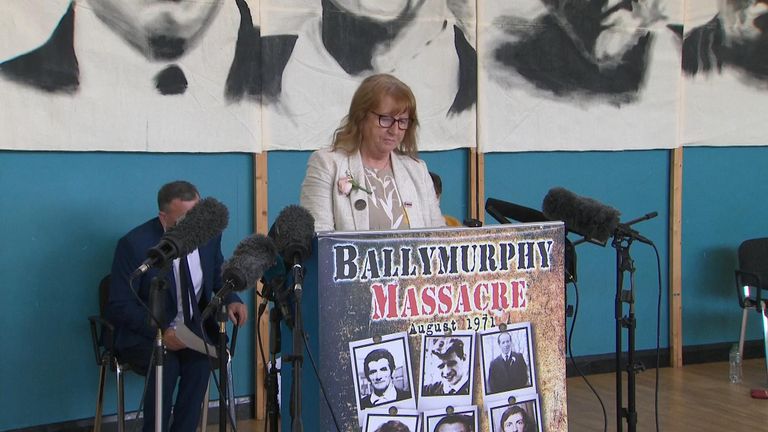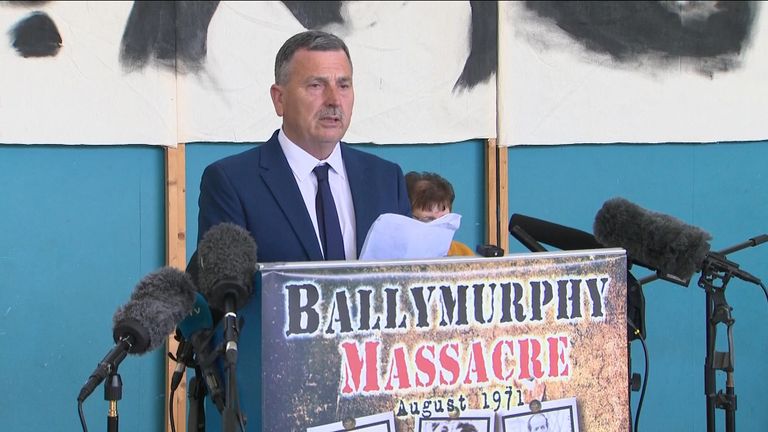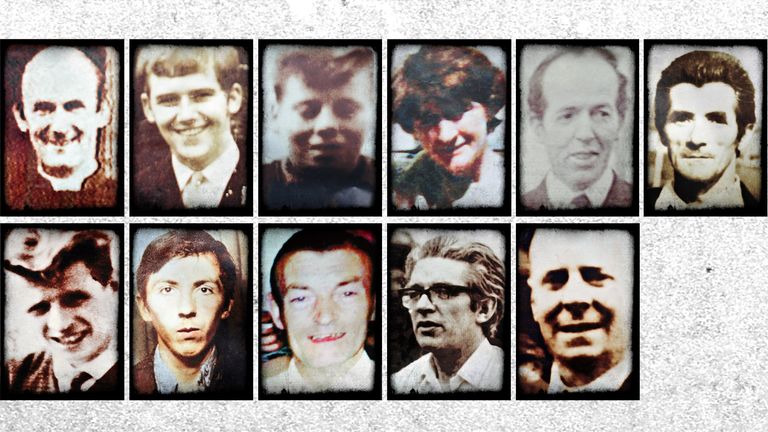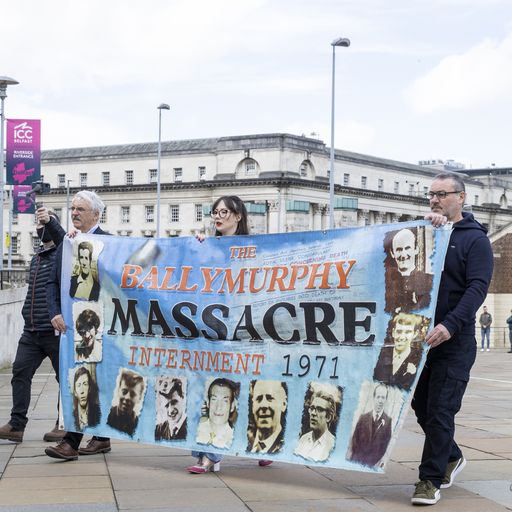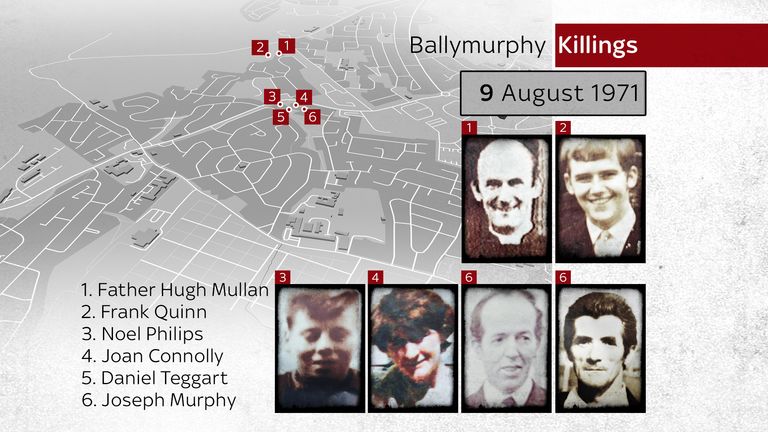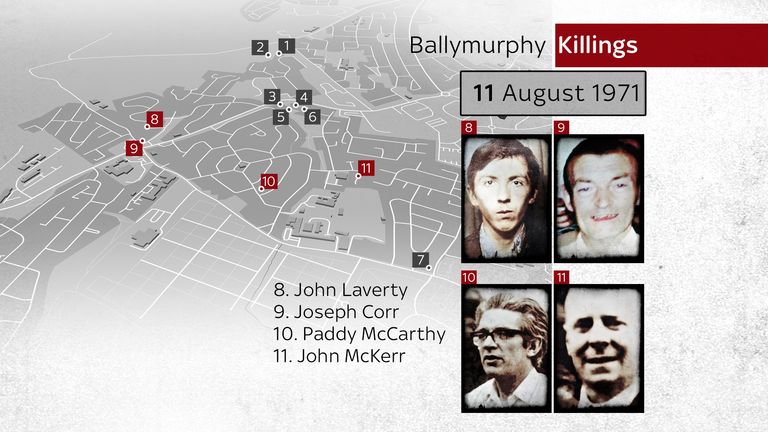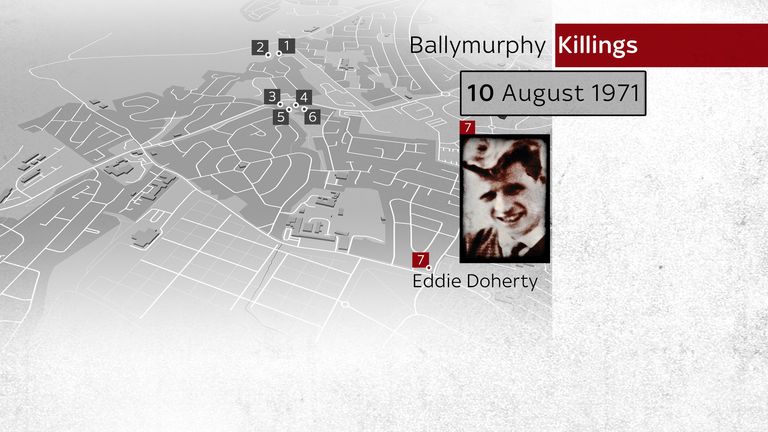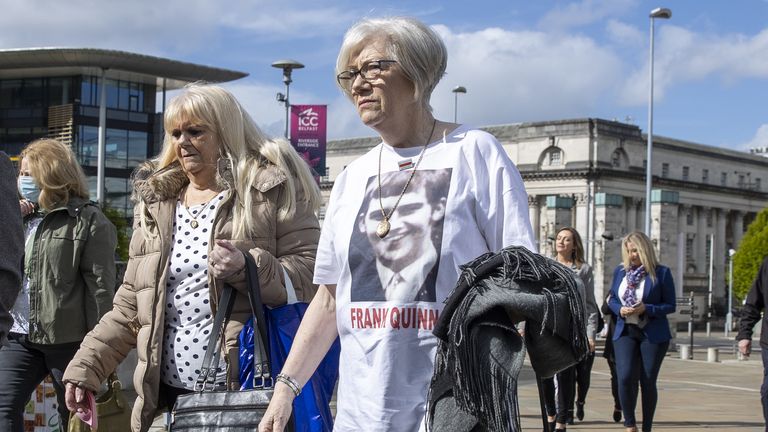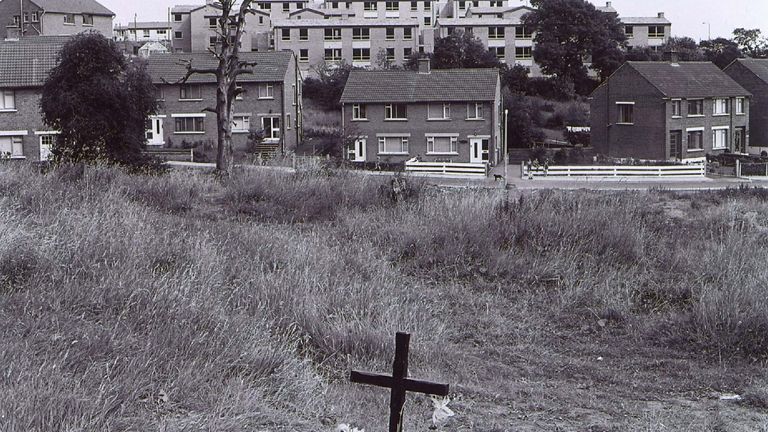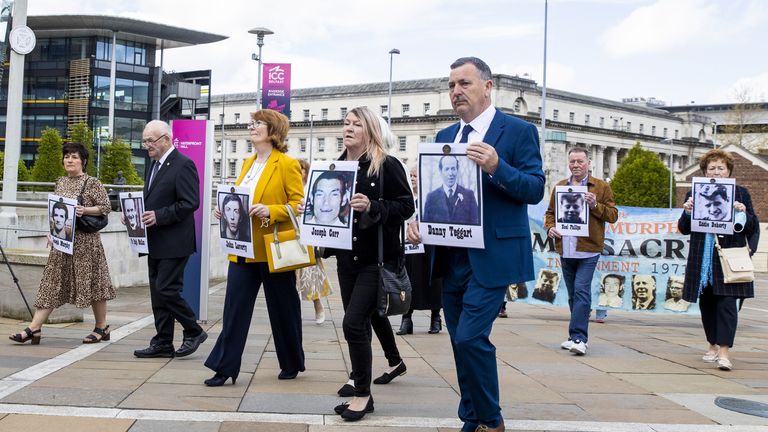Ballymurphy inquest: 10 innocent people killed without justification, coroner finds
A priest and a mother-of-eight were among those shot dead at Ballymurphy, west Belfast, during a British Army operation in 1971.
Tuesday 11 May 2021 18:42, UK
Ten people shot dead at Ballymurphy, west Belfast, in 1971 were innocent and their deaths were without justification, a coroner has ruled.
Relatives of the nine men and one woman who were killed applauded when Mrs Justice Keegan exonerated them and found there had been a disproportionate use of force.
The coroner attributed nine of the 10 shootings to the British Army, saying there was not enough evidence to determine where the shot that killed the 10th victim, John McKerr, came from.
She ruled out paramilitary involvement by any of those killed, and described them as "entirely innocent of any wrongdoing on the day in question".
The families of those killed in Ballymurphy reacted with a mixture of fury and relief to the conclusion of the inquiry, and rejected calls for an amnesty on prosecutions.
Following the ruling, Northern Ireland's deputy first minister Michelle O'Neill described the killings as "British state murder".
"The victims and the families of the Ballymurphy Massacre have been vindicated and the truth laid bare," she tweeted.
Irish foreign minister Simon Coveney said the findings will come as "an immense relief and vindication for the families who have maintained for decades that their loved ones were innocent and their killings unjustified".
He added: "Every family bereaved in the conflict must have access to an effective investigation and to a process of justice regardless of the perpetrator."
The fresh inquests - which began in November 2018 - did not include an 11th victim, Paddy McCarthy, who was shot in the hand at a community centre at Ballymurphy and later died of a heart attack.
Those killed included a Roman Catholic priest, 38-year-old Father Hugh Mullan, and Francis Quinn, 44, who was shot when he went to the churchman's aid.
Four people died in a second incident - Noel Phillips, 19; Joan Connolly, a 44-year-old mother of eight children; Daniel Teggart, 44, and Joseph Murray, 41.
Edward Doherty, 43, John Laverty, 20, and Joseph Corr, 43, were the last three victims of what residents of the community call "the Ballymurphy massacre".
The shootings occurred over three days in August 1971 during serious civil unrest in Belfast when the government moved to detain IRA suspects without trial.
The British Army reported a gun battle with terrorists at Ballymurphy and while there was evidence of some paramilitary activity, the dead were not armed.
Horrified that they had been labelled terrorists, their families rejected the outcome of an inquest and demanded a fresh one.
In Tuesday's ruling, the coroner said Fr Mullan and Mr Quinn were killed by shots fired by soldiers and that the force used was not justified.
She said she was satisfied both entered the field to assist an injured man.
While the coroner said there was evidence of a small number of IRA gunmen in the wider area on the day, she said this did not apply to the waste ground when the men were shot.
She said neither man was armed and they were not in the vicinity of someone with a gun.
Mrs Justice Keegan said there was evidence that the priest had been waving a white item, either a handkerchief or T-shirt.
She also rejected a suggestion from the Ministry of Defence that the men may have been shot by a sniper from the Ulster Volunteer Force (UVF) loyalist paramilitary group.
However, the coroner said she had been unable to identify which soldiers fired the fatal shots.
She rejected claims that Mr Doherty had been throwing petrol bombs at the time he was shot, adding: "He was an innocent man who posed no threat."
Mr McKerr, a former soldier, was shot as he took a break from maintenance work and died of his injuries.
Mrs Justice Keegan said he was an entirely innocent man but there was not enough evidence for her to determine where the shot that killed him came from, or whether it was fired by the military or paramilitaries.
She noted that Mr McKerr was a "proud military man" and claims that he was associated with the IRA had caused great pain for his family in the five decades since.
"I can allay that rumour and suspicion once and for all," she said.
Following the ruling, Mrs Connolly's daughter Briege Voyle told Sky News the coroner said "exactly what we knew".
"Now the world knows - my mummy was an innocent woman. She wasn't a gunwoman," Ms Voyle said.
"She was an innocent woman who came out of a place of safety to help a child."
Ms Voyle said the "soldiers didn't cooperate with the courts so that meant we're left with a lot of questions".
Mrs Justice Keegan described the inquests as the longest running to date in Northern Ireland.
She said the shootings had been a violation of Article 2 of the European Convention on Human Rights - the right to life protected by law.
The findings mark a watershed moment in a campaign that has lasted nearly half a century.
But they come on the very day the government confirmed plans to introduce legislation to address Northern Ireland's past.
That is likely to mean an end to historical prosecutions, an effective amnesty that would apply to both soldiers and terrorists.
Victims on all sides say any statute of limitations on offences before the Good Friday Agreement would deny them justice.
Mrs Voyle told Sky News the British government had been "very disrespectful".
"They're talking about veterans who've had a life - they came here and killed our loved ones and they went home and carried on having a life," she said.
Sinn Fein president Mary Lou McDonald said the coroner's findings were "vindication" of a long campaign by the victims' families.
But she added: "Today will be bittersweet as the British government confirms that they will now attempt to block the families from getting justice, in defiance of an international agreement signed with the Irish government on dealing with the past."

